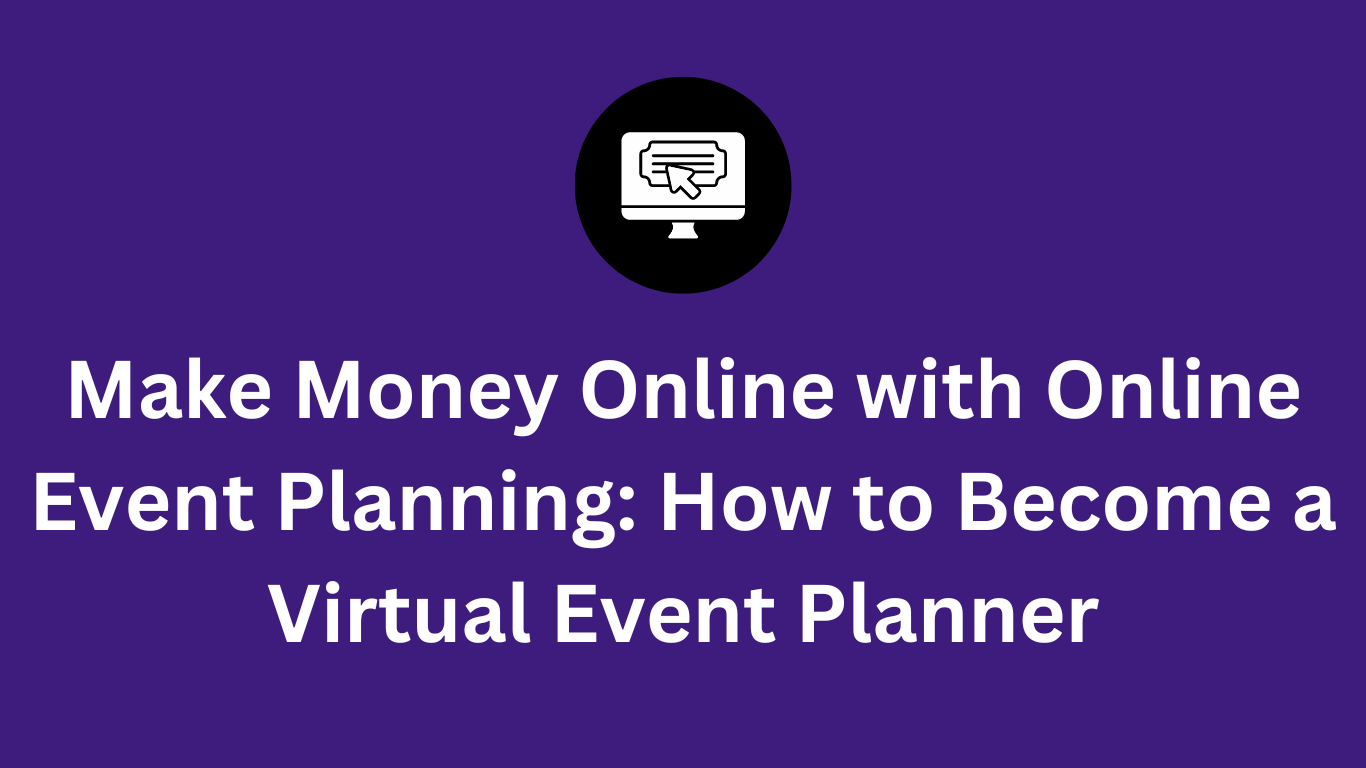In today’s digital age, more and more events are taking place online, which presents a unique opportunity for those looking to break into the event planning industry.
By becoming a virtual event planner, you can work from the comfort of your own home and plan events for clients all over the world. This guide will show you how to get started, from finding clients to organizing and promoting your virtual events.
1. Understanding the Virtual Event Planning Industry

The virtual event planning industry has grown significantly in recent years as more and more businesses and organizations move their events online. Virtual events can include webinars, virtual conferences, virtual trade shows, and virtual networking events, just to name a few. These types of events offer many benefits over in-person events, such as lower costs, increased reach, and the ability to track and measure attendance and engagement.
As a virtual event planner, you will be responsible for helping clients plan and execute virtual events. This can include tasks such as creating event agendas, selecting and booking speakers, coordinating logistics, and managing the technical aspects of the event. It’s also important to be familiar with various virtual event platforms and technologies.
To be successful in the virtual event planning industry, it’s important to have strong project management skills, be highly organized, and have a good understanding of the latest trends and technologies in the virtual event space. Networking and building relationships with other professionals in the industry, as well as staying up-to-date on industry developments, can also help you stay competitive.
Additionally, it’s important to note that virtual event planning can offer many opportunities for freelancers, entrepreneurs, and small business owners, as well as individuals seeking a flexible and remote career.
2. Finding and Attracting Clients
As a virtual event planner, finding and attracting clients is a crucial step in building a successful business. There are a number of different strategies that you can use to find and attract clients, including:
Networking
Networking is a great way to build relationships with other professionals in the industry and learn about potential clients. This can include attending industry events, joining professional associations, and connecting with other virtual event planners on social media.
Referrals
Referrals can be a powerful way to find new clients. Encourage your current clients to refer you to their friends and colleagues, and be sure to thank them for their referrals.
Cold Calling or Emailing

Cold calling or emailing potential clients can be an effective way to generate new business. Be sure to have a clear, compelling message that highlights the value of your virtual event planning services.
Specialization
By specializing in a specific type of virtual event or industry, you can attract clients who are looking for an expert in that area.
Once you have attracted potential clients, it’s essential to build trust and establish a professional relationship. This can include providing a detailed proposal, setting clear expectations, and delivering a high-quality service.
It’s also important to note that building a strong and positive reputation in the industry can be crucial to attracting new clients and retaining existing ones. This can be achieved by providing high-quality service, being responsive to client needs and feedback, and consistently delivering successful virtual events.
3. Planning and Organizing Virtual Events
As a virtual event planner, planning and organizing virtual events is a crucial aspect of your job. The process of planning and organizing virtual events can be broken down into several key steps:
Defining the Event Objectives
The first step in planning a virtual event is to work with the client to define the event objectives. This may include identifying the target audience, determining the event theme and purpose, and outlining the desired outcome of the event.
Choosing the Right Platform
Choosing the right platform for the virtual event is crucial. There are several popular virtual event platforms available such as Zoom, Webex, GoToWebinar and more. Each platform has its own features and capabilities, and it’s important to choose one that will meet the needs of the event and the audience.
Scheduling and Creating an Agenda
Once the platform and objectives are determined, the next step is to schedule the event and create an agenda. This will include selecting the date and time, booking speakers and presenters, and outlining the event schedule and activities.
Coordinating Logistics
Coordinating logistics is an important step in organizing a virtual event. This includes arranging for audio and visual equipment, developing a technical plan for the event, and providing instructions and support for attendees.
Testing and Rehearsals

Before the event, it’s important to test the platform and equipment and conduct rehearsals with speakers and presenters to ensure that everything runs smoothly on the day of the event.
Managing the Event
On the day of the event, the virtual event planner is responsible for managing the event, which includes overseeing the technical aspects, answering questions from attendees, and ensuring that the event runs smoothly.
Planning and organizing virtual events requires strong project management skills, attention to detail, and the ability to think creatively and strategically.
By following these steps and working closely with clients and other event professionals, you can plan and organize virtual events that are engaging, informative, and successful.
4. Managing Virtual Event Budgets
As a virtual event planner, managing budgets is an important aspect of your job. Virtual events can be cost-effective compared to in-person events, but there are still costs associated with planning and executing a virtual event. Some of the key considerations when managing a virtual event budget include the following:
Platform Costs
One of the main costs associated with virtual events is the cost of the platform. Many virtual event platforms have a range of pricing options, so it’s important to choose a platform that fits the budget and the needs of the event.
Speakers and Presenters

The cost of speakers and presenters is another important consideration. This may include fees for their time, as well as any expenses such as travel and accommodations.
Event Materials
Event materials such as handouts, presentations, and giveaways can also add to the budget. It’s important to consider the cost of these materials and how they will be distributed to attendees.
Measuring and Evaluating the Event
Incorporating post-event evaluations and measurements into the budget is crucial for assessing the success of the event. This can involve implementing surveys, collecting feedback through forms, and analyzing data to gain valuable insights.
Managing a virtual event budget requires strong financial management skills and the ability to plan and prioritize expenses.
By effectively managing budgets, you can plan and execute virtual events that are both cost-effective and successful.
5. Marketing and Promoting Virtual Events
Promoting virtual events is a vital aspect of a virtual event planner’s role. As a planner, it is important to have strong marketing skills in order to effectively reach and engage the target audience.
Marketing and promoting virtual events can be challenging, as you need to reach the target audience and make the event stand out in a crowded online space. Some key strategies for marketing and promoting virtual events include:
Identifying the Target Audience
One of the first steps in marketing and promoting a virtual event is to identify the target audience. This includes understanding their needs, interests, and behaviors, as well as the channels they use to find and engage with virtual events.
Creating a Compelling Event Website
A compelling event website can be an effective way to promote the virtual event. The website should include information about the event, such as the date, time, agenda, and speakers, as well as registration information and a call to action.
Utilizing Social Media
Social media can be an effective way to reach the target audience and promote the virtual event. This includes creating and sharing event-related content, as well as running paid social media campaigns to increase visibility.
Post-event Follow-up

Following up after the event is important to keep the engagement going and measure the event’s success. This can include sending out surveys, creating a post-event report, and encouraging attendees to share feedback and engage with the event.
By effectively marketing and promoting virtual events, you can increase visibility, build anticipation, and drive engagement among the target audience.
FAQs
What are some benefits of hosting virtual events?
Some benefits of hosting virtual events include reduced costs, increased accessibility, and the ability to reach a global audience.
How do I choose the right virtual event platform?
Choosing the right virtual event platform depends on your specific event needs and budget. It’s important to research different platforms and compare features, pricing, and customer reviews before making a decision.
How do I keep attendees engaged during a virtual event?
Keeping attendees engaged during a virtual event can include incorporating interactive elements such as polls, Q&A sessions, and breakout rooms, as well as providing a good user experience with a well-designed virtual event platform and encouraging attendees to participate in pre-event and post-event activities.
In conclusion, becoming a virtual event planner can be a rewarding and profitable way to make money online. As more and more businesses and organizations are turning to virtual events as a way to engage with their audiences, there is a growing demand for skilled virtual event planners.
To be successful in this field, it’s important to have a solid understanding of event planning and marketing, as well as the ability to think strategically and creatively. By following the steps outlined in this article and utilizing the right tools and resources, you can develop the skills and knowledge you need to become a successful virtual event planner.
